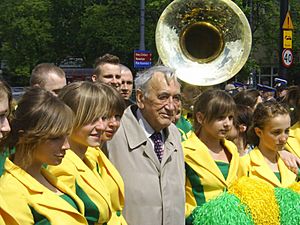Tadeusz Mazowiecki facts for kids
Quick facts for kids
Tadeusz Mazowiecki
|
|
|---|---|
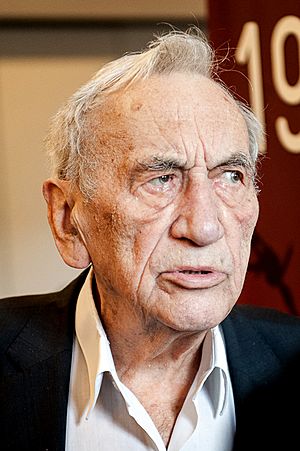 |
|
| Prime Minister of Poland | |
| In office 24 August 1989 – 12 January 1991 |
|
| President | Wojciech Jaruzelski Lech Wałęsa |
| Deputy | Leszek Balcerowicz Czesław Janicki Jan Janowski Czesław Kiszczak |
| Preceded by | Edward Szczepanik (Exile) Czesław Kiszczak |
| Succeeded by | Jan Krzysztof Bielecki |
| Chairman of the Freedom Union | |
| In office 23 April 1994 – 1 April 1995 |
|
| Preceded by | Himself (As Chairman of the Democratic Union) |
| Succeeded by | Leszek Balcerowicz |
| Chairman of the Democratic Union | |
| In office 20 May 1991 – 24 April 1994 |
|
| Preceded by | Position established |
| Succeeded by | Himself (As Chairman of the Freedom Union) |
| Personal details | |
| Born | 18 April 1927 Płock, Poland |
| Died | 28 October 2013 (aged 86) Warsaw, Poland |
| Political party | PAX Association (1949–55) Znak (1961–72) Solidarity (1980–91) Democratic Union (1991–94) Freedom Union (1994–2005) Democratic Party (2005–06) |
| Spouses | Krystyna (d.) Ewa (d.) |
| Children | Wojciech Adam Michal |
| Profession | Author, journalist, social worker |
| Awards | |
| Signature | |
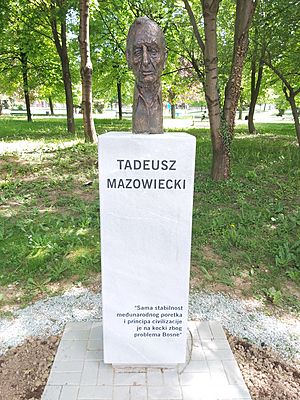
Tadeusz Mazowiecki (born April 18, 1927 – died October 28, 2013) was an important Polish writer, journalist, and politician. He was a key leader in the Solidarity movement. He became the first non-communist Prime Minister of Poland since 1946. This was a very big change for Poland.
Contents
Early Life and Education
Tadeusz Mazowiecki was born in Płock, Poland, in 1927. His family was part of the Polish nobility. His parents worked at the local Holy Trinity Hospital. His father was a doctor, and his mother helped people in need.
His schooling was stopped when World War II began. During the war, he worked as a runner at his parents' hospital. After the war, he finished high school in Płock in 1946. He then studied law at Warsaw University. However, he did not finish his degree. Instead, he focused on working with Catholic groups and newspapers.
Becoming a Catholic Activist
While at Warsaw University, Mazowiecki joined a charity group called Caritas Academica. He also led a university printing group for a short time. In 1946, he joined the Labour Party. But the new communist government in Poland soon made this party illegal.
Most non-communist groups were shut down. One group that was allowed was the PAX Association. This Catholic group supported the communist government. Mazowiecki joined PAX in 1948. He worked as a journalist for their newspapers. He became a deputy editor for the Słowo Powszechne newspaper.
Working with Catholic Groups
Mazowiecki later became editor-in-chief of the Wrocław Catholic Weekly (WTK). He often disagreed with the leaders of PAX. He thought they were too loyal to the communist government. He also felt they were not democratic enough. Because of his criticisms, he was removed from WTK in 1955. He was then expelled from the PAX association.
After leaving PAX, Mazowiecki worked with other independent Catholic journals. He helped start the Club of Catholic Intelligentsia (KIK). This was the first national Catholic group in Poland that was independent from the communist government. He also helped create the Więź Catholic monthly magazine in 1958. He was its first editor. Mazowiecki was a close friend of Pope John Paul II.
Standing Up for Change
In 1956, a group of Catholics, including Mazowiecki, were allowed to form the Znak Association. This group had its own publishing house. It was one of the few independent groups in Poland at the time. A small number of Znak members were allowed to run in the 1957 election. Tadeusz Mazowiecki was one of them.
He served as a member of the Polish Parliament (called the Sejm) until 1971. Poland was a one-party state, meaning the communist party was in control. So, the role of opposition members was mostly symbolic. However, Mazowiecki spoke out on important issues.
Speaking Out in Parliament
He criticized the school curriculum for focusing too much on communist ideas. He also protested a new law that limited freedom of assembly. In 1968, he was the only member of parliament to speak about the harsh treatment of student protests. After protests in 1970, where many people were killed, Mazowiecki demanded an investigation. He wanted to find out who was responsible. Because he questioned the communist authorities, he was not allowed to run for parliament again in 1972.
After leaving the Sejm, Mazowiecki became a well-known Polish dissident. A dissident is someone who strongly disagrees with the government. He supported groups that helped workers who were being treated unfairly. In 1978, he helped start the Society of Scientific Courses. This group was a secret "Flying University" that taught forbidden subjects.
Solidarity and the Fall of Communism
In August 1980, Mazowiecki led a group of experts. This group supported workers in Gdańsk who were negotiating with the government. From 1981, he became the editor-in-chief of the Tygodnik Solidarność weekly magazine. This was a very important newspaper for the Solidarity movement.
When martial law was declared in December 1981, Mazowiecki was arrested. He was held in prison for about a year. He was one of the last prisoners to be released in December 1982.
Negotiating for Freedom
In 1987, he traveled abroad and spoke with many politicians. In 1988, he began talks with the communist government. He strongly believed that power should be taken from the ruling party through peaceful talks. He played a big part in the Polish Round Table Talks. These talks led to partially free elections in Poland on June 4, 1989.
In these elections, Solidarity won almost all the seats they were allowed to compete for. This was a huge victory. The communists had planned for Solidarity to be a junior partner in the government. But Solidarity convinced two smaller parties to support them instead. This meant that the communist President, Wojciech Jaruzelski, had to appoint a Solidarity member as prime minister.
Lech Wałęsa, the leader of Solidarity, chose Mazowiecki for the job. On August 24, 1989, Mazowiecki won a vote of confidence in the Sejm. He became the first Polish prime minister in 43 years who was not a communist. He was also the first non-communist Prime Minister in Eastern Europe in over 40 years. This was a historic moment.
Leading Poland
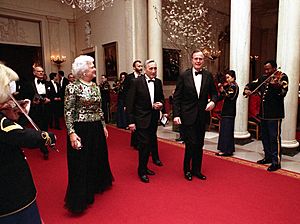
As Prime Minister, Mazowiecki's government made many important changes very quickly. The political system was completely changed. People gained many civil freedoms, and a multi-party system was introduced. The country's name was changed from the People's Republic of Poland to the Republic of Poland. On December 29, 1989, major changes were made to the Polish Constitution.
Mazowiecki used the huge popularity of the Solidarity movement to change Poland's economy. These changes are known as the Balcerowicz Plan. They were named after Mazowiecki's finance minister, Leszek Balcerowicz. The reforms changed Poland's economy from a centrally-planned system to a market economy.
Economic Changes and Challenges
The reforms helped stop very high inflation. They also introduced free markets and allowed state-owned companies to become private. These changes led to lower inflation and a smaller government budget deficit. However, they also caused unemployment to rise. The financial situation for some of the poorest people in society became harder.
In his first speech to parliament, Mazowiecki spoke about a "thick line." He meant that his government would not be responsible for the problems caused by past governments. They would only be responsible for what they did to help Poland from that point on.
After Being Prime Minister
In 1991, Mazowiecki was chosen to be the United Nations' Special Rapporteur. His job was to report on human rights in the area of former Yugoslavia. In 1993, he wrote a report about human rights violations there. But two years later, he resigned. He protested because he felt the international community was not doing enough to stop the terrible events during the Bosnian war. This included the Srebrenica genocide.
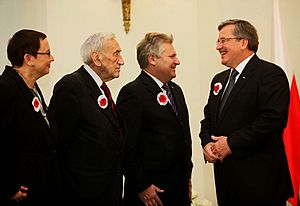
Mazowiecki had a disagreement with Lech Wałęsa. This led to the Solidarity group in parliament splitting. Mazowiecki ran against Wałęsa in the 1990 presidential election. He lost and did not make it to the second round of voting.
In 1991, Mazowiecki became the chairman of the Democratic Union party. Later, this party became the Freedom Union. He was its honorary president from 1995. He served as a member of the Polish Parliament from 1989 to 2001.
Later Political Roles
In 1997, during the creation of the new Polish constitution, Mazowiecki helped write a compromise introduction. This introduction was accepted. In 2002, he left the Freedom Union.
In 2005, he helped create a new party called the Democratic Party – demokraci.pl. He was a leader on their list for the parliamentary elections in Warsaw that year. He received many votes. He was the leader of the party's Political Council until 2006.
Mazowiecki received many awards during his life. These included honorary degrees from several universities. He also received the Order of White Eagle in 1995, which is a very high Polish award. In 2003, he was elected to the board of directors for a fund that helps victims of international crimes. He was a strong supporter of a more united Europe.
Tadeusz Mazowiecki passed away in Warsaw on October 28, 2013. He was 86 years old. Poland's Foreign Minister said that Mazowiecki was "one of the fathers of Polish liberty and independence." He is remembered for his courage and his role in Poland's peaceful transition to democracy.
See also
 In Spanish: Tadeusz Mazowiecki para niños
In Spanish: Tadeusz Mazowiecki para niños


